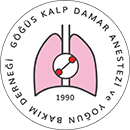

Causes of Excessive Bleeding in Patients Who Underwent Open-Heart Surgery During the Early Postoperative Period
Ismahangül Özbayrak1, Dilşad Amanvermez Şenarslan2, Funda Yıldırım2, Olcay Yaldır Kayalı1, Arzu Açıkel1, Tülün Öztürk11Department of Anaesthesiology and Reanimation, Manisa Celal Bayar University Faculty of Medicine, Manisa, Türkiye2Department of Cardiovascular Surgery, Manisa Celal Bayar University Faculty of Medicine, Manisa, Türkiye
Objectives: This study aimed to identify the incidence and causes of excessive bleeding during the early postoperative phase of open-heart surgery.
Methods: The files of patients who underwent elective open-heart surgery between January 2019 and January 2021 were reviewed. Excessive bleeding was defined according to the amount of hemorrhage during the first 24 h. The patients were divided into the bleeding group (with excessive bleeding, Group B) and control group (no excessive bleeding, Group C). Patients demographic data, clamping and pumping times, intraoperative interventions, and clinical data, such as the need for blood and blood product replacement in the intensive care unit, were obtained. Measurements were performed using Students t-test, MannWhitney U test, Pearsons chi-squared test, and correlation test.
Results: The incidence of bleeding was 9.7%, and the rate of re-exploration was 33%. The presence of chronic obstructive pulmonary disease was significantly higher in Group B (p=0.006). The preoperative use of antiaggregants was significantly higher in Group B than in Group C (p=0.001). No significant difference was observed between the groups in terms of bleeding and coagulation laboratory values as well as the need for intraoperative replacement of blood and blood products. However, the need for postoperative replacement of blood and blood products was significantly higher in Group B (p<0.001). Female sex was found to be negatively correlated with bleeding (p=0.032). Furthermore, a positive correlation was observed between chronic obstructive pulmonary disease, presence of CRF, use of anticoagulant, EuroSCORE, ECD duration, cross-clamping (CC) duration, and bleeding. The incidence of anemia among the patients was 41%.
Conclusion: The incidence of excessive bleeding in the early postoperative period was 9.7%. Of the patients, 33% required surgical reopening. The presence of chronic obstructive pulmonary disease, preoperative antiaggregant use, high EuroSCORE, and long CC and CPB durations may lead to excessive bleeding and may be helpful parameters in the prediction of bleeding. To reduce the risk of postoperative bleeding, We believe that it is crucial to maintain patients' optimal health conditions in terms of comorbidities before surgery. This also includes discontinuing any medications that increase the risk of bleeding for appropriate periods before surgery. Additionally, the use of tranexamic acid and reducing the duration of surgery are other preventive measures that can be taken to minimize risks.
Keywords: Excessive bleeding, open-heart surgery, postoperative period
Manuscript Language: English
(541 downloaded)

















